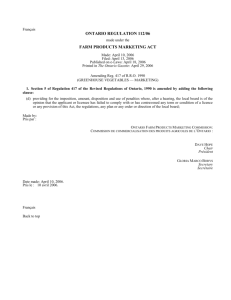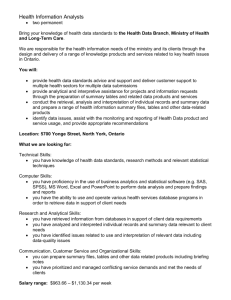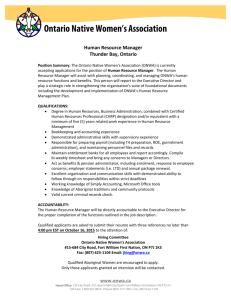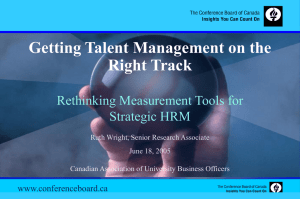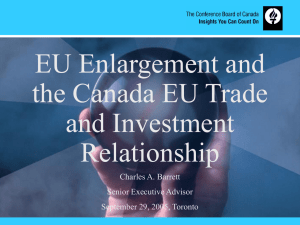Document
advertisement
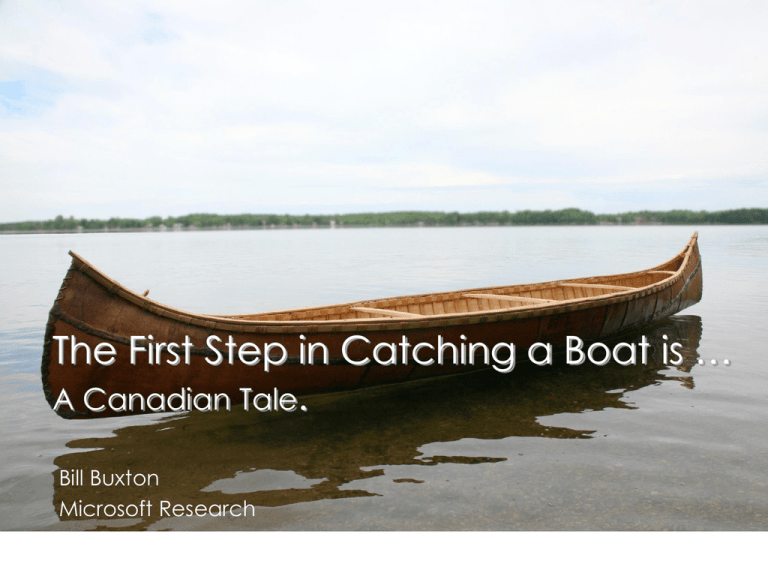
The First Step in Catching a Boat is … A Canadian Tale. Bill Buxton Microsoft Research Of Peers & Data Analysis Benchmarks Canada’s socioeconomic performance against the performance of 16 other top Organization for Economic Cooperation and Development countries across six domains. • Education & Skills: • Economy, Health & Society: • Environment: • Innovation: A B D D http://www.conferenceboard.ca/HCP/default.aspx From: Expand in Ontario Canada [mailto:info@investinontario.com] Sent: February-26-10 7:06 AM To: Bill Buxton Subject: Economist Intelligence Unit keys Dear Bill, The Economist Intelligence Unit – a trusted source of country, industry and management analysis for smart businesses – recently published a study that demonstrates the critical link between innovation and talent management in a company’s ability to prosper. The study, Fertile Ground: Cultivating a talent for innovation, emphasizes the critical importance of talent, along with developing “clusters of excellence,” open innovation and access to capital, as the main elements necessary for successful business innovation. Ontario has the most educated workforce in the G7. In fact, 61% of Ontario’s population between 25 and 64 years of age has completed their post-secondary education. Ontario ’s Technology Triangle is home to three universities, the headquarters of Research In Motion (makers of the BlackBerry® device) and one of Google’s first Canadian offices. The world works here. Find out why at www.investinontario.com And the “Logic? a)Educate others so they catch up, or b)Economic benefit of universities is in tuition fees. G&M, March 9, 2010 Having the right playground Bell Labs Murray Hill, NJ The most dangerous course of action is to take no risk. On Playing it Safe It leads to certain death by slow atrophy. On Policy $1B The Long Nose 1984 2007 Radar Invention Refinement & Augmentation ~ Productization Arrasta Dardanell Mine Wild Horse Creek 1898 Science, invention & innovation do not fit into 5 year terms On Data Informed or Misinformed Policy? What’s Missing but Relevant? How many PhDs doing basic research in Canada today vs 1980? • In public sector? • In private sector? R&D & the OECD Bad Data and Analysis => Bad Policy “… creative work undertaken on a systematic basis in order to increase the stock of knowledge, including knowledge of man, culture and society, and the use of this stock of knowledge to devise new applications[italics mine].” (OECD 2007, p.24) Does basic research, as contrasted with applied research and development, make a significant contribution to an industry's or firm's rate of technological in-novation and productivity change? Mansfield, Edwin (1980). Basic Research and Productivity Increase in Manufacturing. The American Economic Review, 70(5), 863-873. Study: • Surveyed R&D spending of 119 firms between 1967 and 1977 • Represented ~50% of US R&D expenditures. • Observed ~25% reduction in investment in basic research. • For a given investment in R&D, • Is a significant and direct relationship between % applied to basic research and total factor productivity. • an industry's rate of productivity increase during 1948-66 directly and significantly related to the extent to which its R&D was long term. Policy Failure vs Business Success #8 821* #27 32* Mike Lazaridis, founder and CoCEO of Research In Motion (RIM) *Times Eng & IT Rating / Invention Disclosures 2003-2006 Perimeter Institute (1999) Alias Research • • • • • • • Established 1994 Revenue ~$80M USD ~500 employees 4 different owners 6 different presidents Employees: ÷ 3 Research: x 3 The Rule of Unintended Consequences Science, Social Science & Culture: What have we learned about learning? Frederick Grant AKA: Sir Frederick Banting, Nobel Medicine 1923 For Discovering Insulin, breadth literate expert depth Business Technology Design In Summary: • Academic industry-relevant research is neither. • Shifting from basic to applied research -> decrease in productivity • Demonstrating industry relevance should be cue to stop academic funding. Consequences …. • Historically, nearly all great sustainable breakthroughs came as unexpected results • A 20 year horizon is already too short sighted • Science cannot thrive in a cultural vacuum • Risk aversion is the most dangerous course of action Can We Change Our Culture? Questions? www.billbuxton.com

